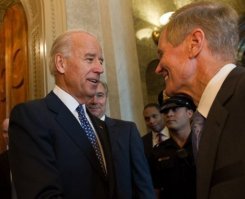 |
| US Vice President Joe Biden (L) on Tuesday heads to China © AFP/File Nicholas Kamm |
WASHINGTON (AFP) – Vice President Joe Biden heads to China in hopes of winning favor with the rising power’s next leader, seeking a smoother relationship after Beijing’s sharp criticism of US fiscal policy.
Biden will spend five days in China, an unusually long trip that comes at the invitation of Vice President Xi Jinping who is expected to take over as China’s leader by 2013 and is little known in US policy circles.
“Simply put, we’re investing in the future of the US-China relationship,” said Tony Blinken, the vice president’s national security adviser.
The number-two US leader will also visit close ally Japan, where he will go to an area hit by the March 11 mega-earthquake and encourage a quick recovery, and Mongolia to praise its embrace of democracy.
In China, Biden will meet President Hu Jintao in Beijing and travel the country alongside Xi. In the southwestern boomtown of Chengdu, the vice presidents will dine at an informal restaurant and Biden will deliver a speech, Blinken said.
Biden’s visit comes after stinging criticism in China’s state-run media of the US “addiction to debt” following a deal reached by US lawmakers that narrowly averted a default. China is the largest foreign holder of US debt.
Lael Brainard, the undersecretary of the Treasury for international affairs, defended the controversial deal as “very strong” and, in a preview of Biden’s message, said that China must now also undertake reforms.
Biden will tell China that its yuan remains “substantially undervalued” and urge the second largest economy to move from manufacturing inexpensive exports to encouraging its own growing middle class to consume, she said.
“Chinese policymakers know that they can no longer count on the US consumer to provide that demand to the global economy,” Brainard told reporters on a conference call.
“They’ve got tremendous capacity to help bolster global growth by switching to a domestic demand-led growth strategy.”
Brainard insisted that the United States remained “the most flexible, the most innovative” economy and called the debt deal “a major step” in putting US finances in order.
Xi’s views remain a mystery in Washington.
Bonnie Glaser, a senior fellow at the Center for Strategic and International Studies, said the 58-year-old came from a new generation that was more accustomed to the outside world yet also more nationalistic.
She said much of Washington’s knowledge of Xi has come through interlocutors such as Australia’s Mandarin-speaking Foreign Minister Kevin Rudd and Singapore’s elder statesmen Lee Kuan Yew.
But Glaser expected Xi to reveal little of his thinking during Biden’s visit, as he will be exceptionally cautious before taking power.
“We may get glimpses into his thinking, but even those people who are close to him in China are not clear about where he stands on very controversial, sensitive topics such as political reform,” Glaser said.
The White House insisted that Biden would not shy away from human rights.
Activists say that China is holding numerous prisoners for political reasons, including Nobel Prize-winning writer Liu Xiaobo, and has stepped up its controls on perceived dissent.
“The protection of human rights globally is a central part of President Obama’s foreign policy in China, as it is elsewhere,” said Danny Russell, the senior White House adviser on Asia.
“As we do consistently, we will raise our concerns about the human rights situation throughout China,” he said.
Xi visited Tibet last month and vowed to crush “separatist activities” by the region’s exiled spiritual leader the Dalai Lama.
His address came one day after Obama received the Dalai Lama, who is widely respected around the world and says he is not seeking independence.
Russell said that Biden would not bring up arms sales to Taiwan, although he expected Beijing to raise the issue.
US law requires the administration to provide Taiwan with means of self-defense; under longstanding policy, the United States does not consult China beforehand.
US magazine Defense News reported Sunday that the Obama administration has rejected Taiwan’s request for advanced F-16 fighter-jets, which the island believes it needs to balance China’s rising military edge.
Administration officials said they have not made a decision.
© AFP — Published at Activist Post with license
linkwithin_text=’Related Articles:’



Be the first to comment on "Biden on mission to woo next China leader"